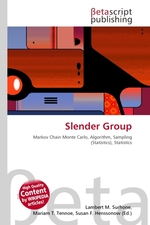Slender Group
Lambert M. Surhone, Miriam T. Timpledon, Susan F. Marseken
бумажная книга
High Quality Content by WIKIPEDIA articles! Let G be a group. An element g of G is called a torsion element if g has finite order. If all elements of G are torsion, then G is called a torsion group. If the only torsion element is the identity element, then the group G is called torsion-free. Let M be a module over a ring R without zero divisors. An element m of M is called a torsion element if the cyclic submodule of M generated by m is not free. Equivalently, m is torsion if and only if it has a non-zero annihilator in R. If the ring R is commutative, then the set of all torsion elements forms a submodule of M, called the torsion submodule of M, sometimes denoted T(M). The module M is called a torsion module if T(M) = M, and is called torsion-free if T(M) = 0. If the ring R is non-commutative then the situation is more complicated, and the set of torsion elements need not be a submodule.
Данное издание не является оригинальным. Книга печатается по технологии принт-он-деманд после получения заказа.


